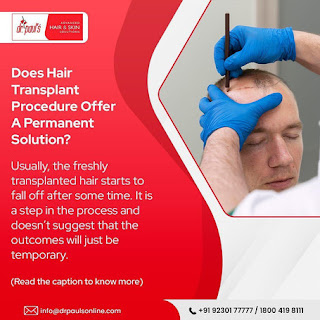The Link Between Stress and Hair Loss: Managing the Invisible Culprit
Hair loss is a common concern that affects millions of people worldwide. While various factors contribute to hair loss, including genetics and hormonal imbalances, one often overlooked culprit is stress. The connection between stress and hair loss has gained significant attention in recent years. Chronic stress can disrupt the hair growth cycle and lead to excessive shedding. Though treatments like hair loss treatment in Kolkata offer solutions to hair loss, identifying and eliminating the root causes are essential.
Understanding the Science
Stress triggers a complex chain of reactions in the body, including the release of stress hormones such as cortisol. Elevated cortisol levels can disrupt the normal functioning of hair follicles, leading to hair loss. Chronic stress can push hair follicles into a resting phase, known as telogen, where hair sheds more rapidly than it grows. This condition, called telogen effluvium, can result in diffuse hair thinning.
Furthermore, stress can also disrupt the delicate balance of the hair growth cycle by shortening the anagen phase, which is the active growth phase of hair. As a result, hair follicles spend less time growing and more time resting, leading to reduced hair density and slower growth.
Managing Stress for Healthy Hair
Recognize and Address Stressors
Identify the sources of stress in your life and take steps to manage or eliminate them. This may involve adjusting your work-life balance, seeking support from loved ones, or seeking professional help.
Practice Relaxation Techniques
Engage in activities that promote relaxation and reduce stress. These may include meditation, deep breathing exercises, yoga, or mindfulness practices. Regularly incorporating these techniques into your routine can help lower cortisol levels and promote hair health.
Exercise Regularly
Physical activity has been shown to reduce stress and improve overall well-being. Aim for at least 30 minutes of moderate exercise, such as brisk walking or jogging, most days of the week. Exercise promotes blood circulation, which can nourish hair follicles and support healthy hair growth.
Prioritize Self-Care
Make time for self-care activities that help you unwind and rejuvenate. This can include taking warm baths, reading, listening to music, or pursuing hobbies you enjoy. By prioritizing self-care, you can effectively manage stress levels and promote better hair health.
Maintain a Balanced Diet
Proper nutrition is crucial for healthy hair growth. Include foods rich in vitamins, minerals, and proteins in your diet. Opt for a variety of fruits, vegetables, whole grains, lean proteins, and healthy fats. Additionally, stay hydrated by drinking an adequate amount of water daily.
Get Sufficient Sleep
Lack of sleep can contribute to increased stress levels and negatively impact hair health. Aim for 7-8 hours of quality sleep each night to allow your body and mind to recover from daily stressors.
Avoid Excessive Styling and Heat
Excessive heat from styling tools, such as hair dryers, straighteners, and curling irons, can damage hair and contribute to hair loss. Limit the use of such tools and opt for heat protectant products when styling. Additionally, avoid tight hairstyles that pull on the hair, as this can lead to traction alopecia, a form of hair loss caused by constant tension on the hair follicles.
Practice Scalp Massage
Massaging the scalp can increase blood circulation to the hair follicles, promoting healthier hair growth. Use your fingertips to gently massage your scalp in circular motions for a few minutes each day. You can also incorporate essential oils, such as lavender or rosemary oil, into your scalp massage routine for added relaxation and potential hair benefits.
Seek Support
Sometimes, managing stress on your own can be challenging. It can be helpful to seek support from a therapist, counselor, or support group. They can provide guidance, coping strategies, and a safe space to discuss your stressors and emotions. Talking to a professional can also help you gain new perspectives and develop effective stress management techniques.
Consider Stress-Reducing Supplements
Certain supplements have been shown to help reduce stress levels and support hair health. For example, adaptogenic herbs like ashwagandha and Rhodiola rosea have stress-reducing properties. Additionally, supplements containing biotin, vitamins, and minerals that support hair growth, such as B-vitamins, vitamin D, zinc, and iron, may be beneficial. However, it is important to consult with a healthcare professional before starting any new supplements to ensure they are safe and suitable for you.
Conclusion
Managing stress is a long-term commitment, and results may take time. If you continue to experience excessive hair loss despite stress management efforts, it is advisable to consult a healthcare professional or a dermatologist specializing in hair health. They can provide personalized guidance and recommend suitable treatments to address any underlying causes of hair loss, ensuring you achieve optimal hair health while managing stress effectively. Also you can get advice on the best hair treatments in Kolkata.


Comments
Post a Comment